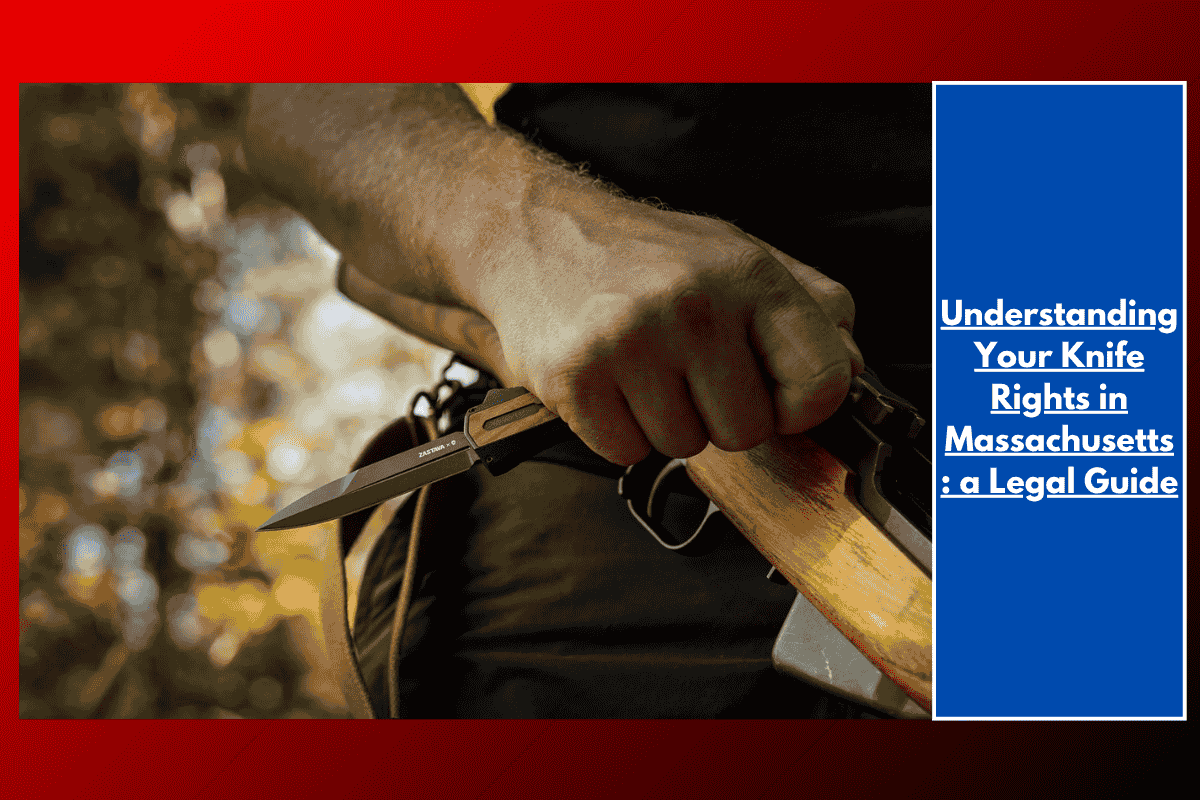In Massachusetts, like in many other states, the laws regarding the possession, carry, and use of knives are complex. Whether you’re an outdoors enthusiast, a collector, or simply someone who carries a pocket knife for daily use, it’s important to understand the legal framework that governs knives in the state. This guide will help you navigate Massachusetts knife laws, including the types of knives that are legal, restrictions on carrying knives, and important factors to consider when using or possessing a knife.
Are Knives Legal in Massachusetts?
Yes, knives are legal to possess in Massachusetts, but the state has laws that regulate certain types of knives, how they are carried, and where they can be used. While many common knives, such as pocket knives and utility knives, are allowed, there are restrictions on specific types of knives and how they are carried in public.
Types of Knives Regulated in Massachusetts
Folding Knives and Pocket Knives
Folding knives and pocket knives are legal to possess in Massachusetts as long as they are not used for illegal activities.
These knives are commonly used for everyday purposes like opening packages or cutting rope and are typically not subject to the strict regulations that apply to larger or more dangerous knives.
Fixed Blade Knives
Fixed blade knives, such as hunting knives or survival knives, are legal in Massachusetts, but they can be subject to restrictions depending on where and how they are carried. If the knife is openly carried in a public place, it could potentially raise legal concerns under Massachusetts’ dangerous weapon laws.
Switchblade and Spring-Assisted Knives
Switchblade knives (knives that open automatically when a button or mechanism is pressed) are illegal in Massachusetts.
Spring-assisted knives, which open with the help of a spring mechanism but require manual effort to fully open, are legal in Massachusetts, but if they can be opened too quickly or are considered a “switchblade” by definition, they could face legal scrutiny.
Gravity Knives
A gravity knife, which opens by the force of gravity or a flick of the wrist, is also illegal in Massachusetts. These knives are considered dangerous weapons and are prohibited under state law.
Bowie Knives and Large Knives
Bowie knives and other large, fixed-blade knives are legal to possess but are subject to stricter regulations regarding how they are carried. Carrying a large knife in a public place without a valid reason can lead to legal trouble.
Carrying Knives in Massachusetts
Concealed Carry Laws
In Massachusetts, carrying a concealed knife can be more complicated than carrying an open knife. Under Massachusetts law, you are prohibited from carrying a knife in a concealed manner unless you have a license. This means that carrying a knife hidden in your pocket or under your clothing can lead to legal consequences if you don’t have the proper permit.
Open Carry Laws
While open carrying of knives is legal in Massachusetts, there are certain limitations:
Carrying a large, fixed-blade knife or a weapon in public without a valid reason could lead to charges under the Massachusetts dangerous weapon statute.
Carrying a knife for self-defense purposes in a public place could be questioned by law enforcement, as Massachusetts generally does not allow carrying weapons for self-defense unless you have a legal justification (such as a license to carry firearms).
Dangerous Weapons” Laws
Massachusetts has a broad definition of dangerous weapons under Chapter 269, Section 10 of the General Laws. This statute prohibits the carrying of dangerous weapons in public without a valid reason, and knives are often included under this category if they are seen as being used for offensive purposes. Violating these laws can result in serious legal consequences, including fines and imprisonment.
When Can Police Seize Your Knife?
Police in Massachusetts can seize your knife if it is being carried in a manner that violates state laws or municipal ordinances. For example:
If you are carrying a switchblade or a gravity knife, which are illegal in the state.
If your knife is deemed to be a dangerous weapon and you do not have a lawful reason to carry it in public.
If you are involved in an altercation or are suspected of criminal activity, and your knife is perceived as a threat.
If your knife is seized by law enforcement, you may be charged with a crime depending on the circumstances, and the knife may be subject to forfeiture.
Self-Defense and Use of Knives
In Massachusetts, the use of a knife for self-defense is legally complicated. While you are allowed to defend yourself in certain situations under the Castle Doctrine or Stand Your Ground laws, your actions must be reasonable and proportionate to the threat you face. The use of a knife in self-defense could lead to legal consequences, especially if it is deemed excessive or unjustified.
If you use a knife in self-defense, it is crucial to demonstrate that you were in imminent danger of harm and that the use of a knife was necessary to protect yourself. This is a complex area of law and may require legal representation.
Minors and Knives
In Massachusetts, there are additional restrictions for minors carrying knives. The law prohibits minors under the age of 18 from possessing dangerous knives, such as switchblades or large fixed-blade knives, without parental permission or unless they are engaging in activities that require such a knife (such as hunting, camping, or fishing). Parents can be held accountable if their minor children are caught possessing illegal knives.
Municipal Ordinances
Local cities and towns in Massachusetts may have their own ordinances regarding knives, especially in urban areas like Boston. These ordinances may impose additional restrictions on carrying knives, particularly in public parks, schools, and government buildings. Always check local rules in your area, as they may vary from state laws.
Massachusetts has strict regulations regarding knives, and it’s crucial to be aware of what is legal and illegal. In general, knives are legal to possess, but certain types (such as switchblades and gravity knives) are prohibited. Carrying knives in public is subject to restrictions, especially if the knife is concealed or considered a dangerous weapon. If you plan to carry a knife, ensure that it is legal in your area, and be mindful of the circumstances surrounding its use. For any concerns or doubts, it’s always wise to consult with an attorney to ensure you remain within the bounds of the law.
SOURCES
[1] https://www.arenaaccessories.com/Big-Changes-in-Massachusetts-Switchblade-Laws-in-2025–What-You-Need-to-Know_b_16.html
[2] https://www.tektoknives.com/blogs/news/massachusetts-knife-law-update-switchblades-now-legal
[3] https://www.akti.org/state-knife-laws/massachusetts/
[4] https://www.mass.gov/info-details/massachusetts-law-about-guns-and-other-weapons
[5] https://www.youtube.com/watch?v=MyZ5Zl9E6WY














